| Reviews & Columns |
|
Reviews DVD TV on DVD Blu-ray 4K UHD International DVDs In Theaters Reviews by Studio Video Games Features Collector Series DVDs Easter Egg Database Interviews DVD Talk Radio Feature Articles Columns Anime Talk DVD Savant Horror DVDs The M.O.D. Squad Art House HD Talk Silent DVD
|
DVD Talk Forum |
|
|
| Resources |
|
DVD Price Search Customer Service #'s RCE Info Links |
|
Columns
|
|
|
Shogun - 30th Anniversary Edition
A bit of a disappointment...at least in this DVD release. CBS DVD and Paramount have re-released Shogun, the blockbuster NBC miniseries that kept tens of millions of pre-VCR viewers glued to their sets for five September nights way back in 1980. Based on the James Clavell bestseller, and starring Richard Chamberlain, Toshiro Mifune, and Yôko Shimada, Shogun came close to beating the record ratings for ABC's Roots when it first premiered, so there are a lot of viewers out there, my age and older, who no doubt have fond memories of this exciting miniseries. It's unfortunate, then, that CBS DVD and Paramount couldn't summon up some extra extras for what amounts to here as nothing more than a re-release of the exact same DVD set from 2003...right down to that cutting edge trailer for all those new-fangled Indiana Jones DVDs. Still...at least it's back in print. Students of television history and fans of the miniseries genre who don't already have the 2003 release, will be the best fit here.
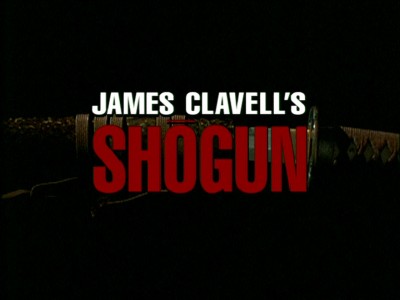
Author's note: It's not within the scope of this brief review to detail the many subplots and characters found in the 9+ hour Shogun; this synopsis is only to set the stage.
Feudal Japan, 1598. Wayward Dutch trading vessel The Erasmus, having successfully navigated the Straits of Magellan, and piloted by Englishman John Blackthorne (Richard Chamberlain), shipwrecks off the coastal waters of Japan, near the village of Anjiro. The "Japans," as Blackthorne has been telling his disbelieving crew, do exist. However, the arrogant Blackthorne and crew are viewed by the exceedingly polite--and exceedingly deadly--samurai who rule the village, as barbarians from a vastly different culture who are worthy only of suspicion. Met by Portuguese priest Father Sebastio (Leon Lissek), Blackthorne refuses to hide his hostility towards the Jesuit (England wars with Spain and Portugal, while Portugal jealously guards her trade and control over Japan), who likewise states the Englishman will die a pirate's death. Blackthorne, immersed in a warrior culture he doesn't understand, personally insults head samurai Omi (Yuki Meguro), only to soon learn humility from the soldier who urinates on the stiff-necked Blackthorne (Blackthorne endures this unimaginable humiliation to save one of his crewmen from being boiled alive).
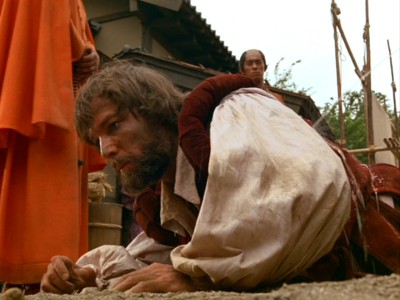
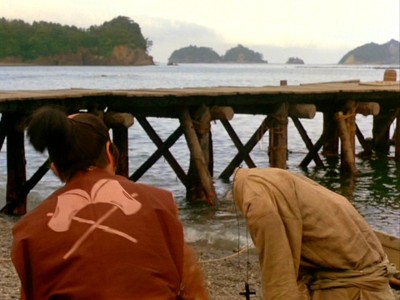
Kept as a prized pet by Omi's leader, Lord Kasigi Yabu, Daimyo of Izu (Frankie Sakai), and "befriended" by Portuguese pilot Rodrigues (John Rhys-Davies), Blackthorne is conveyed by slave ship to Yabu's master, Yoshi Toranaga, Lord of the Kwanto (Toshiro Mifune), who slyly grasps the importance of gleaning information from this stranger. In exchange for information on European warfare and sailing techniques, Blackthorne is allowed to live in increasing comfort as he develops a true friendship with the wise Toranaga. Blackthorne is even given the services of an interpreter and teacher of culture in Lady Mariko Buntaro-Toda (Yôko Shimada), a mesmerizingly beautiful creature who soon captures Blackthorne's heart. However, multiple obstacles stand in the way of Blackthorne's love for Mariko, including her marriage to master archer Lord Buntaro (Hideo Takamatsu), Blackthorne's refusal to abide by the strict Japanese culture, and most critically, his central role in the three-way fight between the Jesuits, embodied by the crafty, calculating Father Martin Alvito (Damien Thomas), who see him as a threat to their hold on Japan, and the brewing civil war that is to come between Toranaga and his rival for title of shogun, Ishido, ruler of the Osaka Castle (Nobuo Kaneko).
MAJOR PLOT SPOILERS!
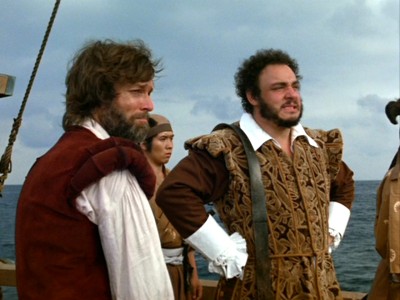
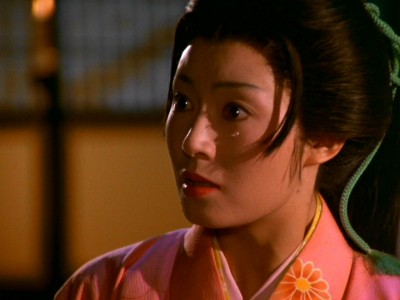
I haven't seen Shogun since it first played in 1980, but trust me, no one who tuned into that first night's episode forgot: 1) the peasant getting his head lopped off for failing to bow to Omi, and 2) Chamberlain getting enthusiastically pissed on by same said Omi. It's getting hard now even for me to remember just exactly how innocent those TV times felt back then (after decades of being exposed--and numbed--to the exponentially-increasing violence and sex of today's television), so it's impossible to convey to new viewers what a shock it was to see those two events unfold on a prime-time network broadcast. You can (successfully) debate the aesthetic worth of Shogun all you want. However, there's no question that those two moments in the story electrified audiences who were already intrigued by what they were seeing, fulfilling exactly the purpose of these "big event" miniseries: grab the viewer by the throat, preferably through the tried-and-true dramatic elements of sex and violence, and and keep them coming back for the commercials.
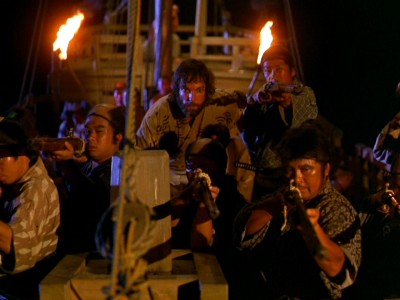
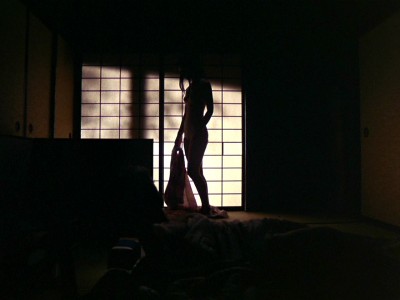
Miniseries were made for "sweeps" periods, back when the "Big Three" determined their ad rates based on ratings' performance during three key calendar periods: November, February, and May. Shogun broke with tradition when savvy NBC honcho Fred Silverman ("The Man With the Golden Gut") opened his Fall season with this rather outrageously unconventional mini (outsized violence and sex, a foreign historical context largely unfamiliar to American audiences, long passages of unintelligible Japanese dialogue)--a bold programming move that turned into a perfect happenstance of history since the premiere of Shogun coincided with a nasty production strike, eliminating any first-run competition for the mini, which greatly boosted its ratings' numbers. Never mind that lead Chamberlain was probably the last choice of the networks to anchor this massive project (author Clavell and NBC desperately tried to get Sean Connery for the role, but the ornery, notoriously work-shy Connery reportedly laughed at the suggestion of his shooting a mere television movie for months in Japan--a country he openly admitted to not liking when he made the Bond film, You Only Live Twice, there). And forget NBC's initial worries that middle America and the two coasts might be bored to tears with nine hours of feudal Japanese history...at a staggering cost of $20 million 1980 dollars. Once Shogun showed up on the NBC schedule on September 15th, with not a single new episode of M*A*S*H or Three's Company or The Dukes of Hazzard to harass it in the Nielsen's, its popularity was almost assured: why, after all, would you watch an old Charlie's Angels rerun...when you can watch some guy get peed on?
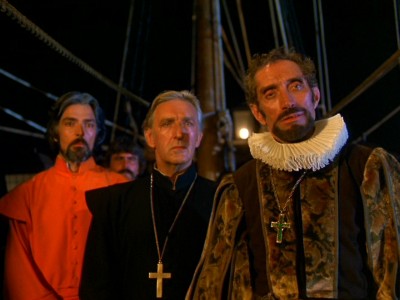
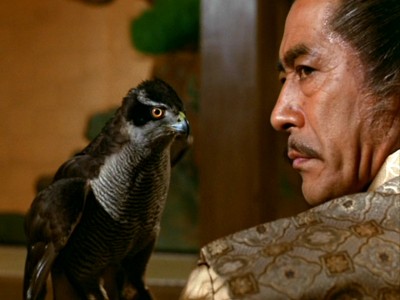
So much for the network view of Shogun. Aesthetically, as a film, as a miniseries, though, how does Shogun hold up after 30 years? The short answer? "Not too bad." I don't agree that Shogun is the pinnacle of the miniseries form, but it is exceptionally well-written, largely well-acted, and unconventionally designed (for my money, nothing will ever equal the visual and thematic scope of Dan Curtis' and Herman Wouk's War and Remembrance, the single most harrowing look at the Holocaust I've ever seen--and that includes Spielberg's overrated Schindler's List). Most reviewers usually comment first on the novelty--at least in television at the time--of screenwriter Eric Bercovici (the guy wrote anything, from the excellent Hell in the Pacific, The Culpepper Cattle Co. and mini Washington: Behind Closed Doors, to stuff like Three the Hard Way and Elvis' Change of Habit), and director Jerry London (minis The Scarlet and The Black, Ellis Island, and the superlative Chiefs, with Charlton Heston...when's that coming out on disc?) winnowing down Clavell's massive tome into an adventure/political drama/romance seen strictly from Blackthorne's P.O.V.. By refusing to explain long passages of Japanese dialogue, we experience what Blackthorne experiences, including culture shock and confusion, until he gradually becomes more savvy to the Japanese way of life. And this technique works marvelously well...at first. However, once the character begins to learn and then master the language, why not subtitle? Logically, it doesn't make much sense, either, to have interpreters explaining the simplest exchanges to Blackthorne in later passages when supposedly, he's already long-mastered the language. Why not get the full flavor of what is being said by these intriguing Japanese characters by using subtitles, then? Even the producers must have known this technique wasn't working past the early scenes, because eventually they're forced to incongruously drop in narrator Orson Welles at various times (in his full, awful "We will serve no wine...before it's time," portentousness) to translate more complicated passages from Mifune and other characters. Shogun's plotting becomes too dense, too subtle, to survive a technique that starts out as expressive, but which eventually turns into a restrictive gimmick.
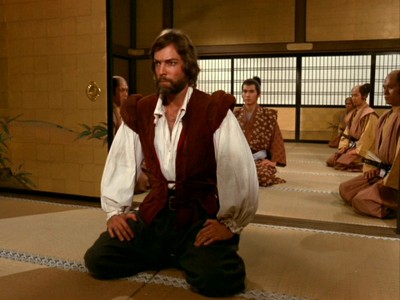
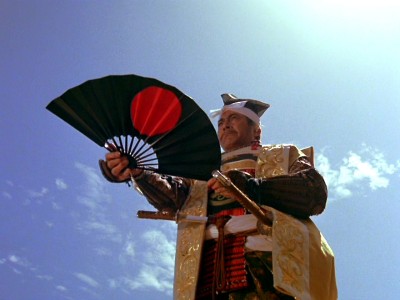
As well, some scenes and passages in Bercovici's script feel severely truncated or underdeveloped, making the viewer wonder if too much of the book was stripped away, affecting the coherence of these scenes. A good example is Blackthorne's "mad" scene, where he saves Mifune's life by acting mentally deranged, complete with hopping and screeching and mugging. It's a good scene, and we can guess why Chamberlain is doing what he's doing (we've seen that scene before in other films, frankly), but we're never given any context as to why he would suddenly decide to act that way, or indeed why anyone else would let him act that way without killing him straight off. We don't know enough about the characters to explain these actions; perhaps it's explained better in the book (as well, other scenes seem unnecessarily elongated and obtuse, such as Lady Ochiba's birthday party, a character who is shot as if she's going to significantly contribute to the narrative...but who comes and goes quickly).
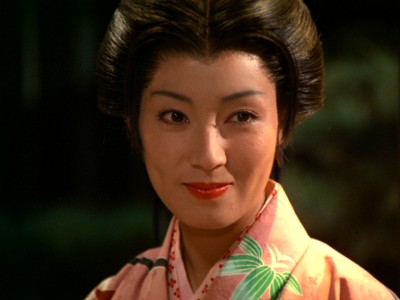
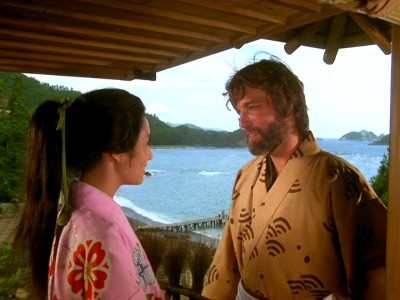
While not a deal-breaker with Shogun, Richard Chamberlain's performance is resolutely "TV" in its scaled-back smallness. Chamberlain, a good actor who's better when he's quiet and sincere, or quiet and oily (Dr. Kildare, or his marvelously villainous turn in The Towering Inferno), just doesn't feel like a rough-hewn 16th- century English sailor (his reaction to a guy getting beheaded is comically overdone...considering 16th-century English sailors were routinely exposed to such nautical horrors as keel-hauling and "walking the plank" for the sharks below). He's too taciturn, too calm, to carry off what should have been a rousing turn (any of the big-screen talents sought for this role--Connery, Roger Moore, Albert Finney--would have effortlessly filled out the role). For this kind of action/adventure, he's far too dialed-back; and when he does try for rambunctious, such as when he screams, "Turn, you whore from hell!" when he's battling The Erasmus through a storm, the effect is giggle-inducing. Luckily, the soft, romantic Chamberlain is given plenty to do here in his scenes with Shimada, and he's quite good interacting with that beautifully expressive actress.
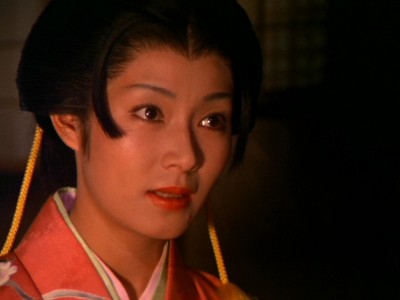
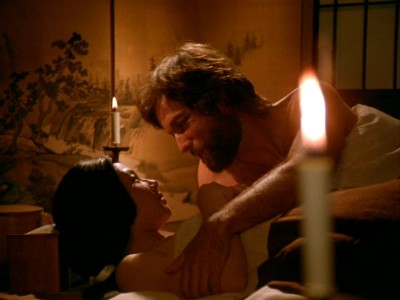
Where Shogun excels is in its admirable attempt to illustrate some of the intangibles of feudal Japanese culture (and the clash against Blackthorne's Western views), as well as in the construction of the Mariko character. It's engrossing to watch viewer substitute Blackthorne begin to excel at the complicated moves in feudal Japanese society, although the script is always careful to never let Blackthorne become a master, keeping him and us continually off guard just when we think he's got the game figured out. A good example comes early when Toranaga rewards Blackthorne with a return trip to Anjiro, for the purpose of safekeeping from Ishido, and to fully learn the intricacies of the Japanese language. We think Blackthorne can now sufficiently handle himself, since he has such a powerful "in," until he learns that the whole village will be massacred--women and babies, as well--if he isn't fluent in the language in six months. It's a horrifying moment for Blackthorne, an inexplicable lesson in the opaqueness of the world he now inhabits, and one that forces him to adopt equally severe Japanese measures (he threatens ritual seppaku if Lord Yabu doesn't rescind the order) to cope with the situation. Shogun's script doesn't try to rationalize this alien culture, nor does it overly criticize it in context with Blackthorne's Western ways; it just presents this world, as is, and let's the viewer/Blackthorne navigate it.
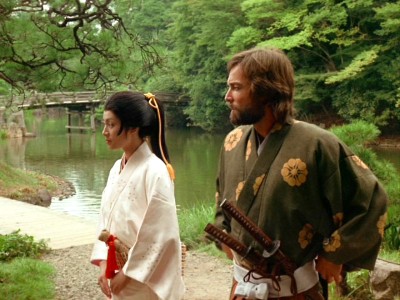
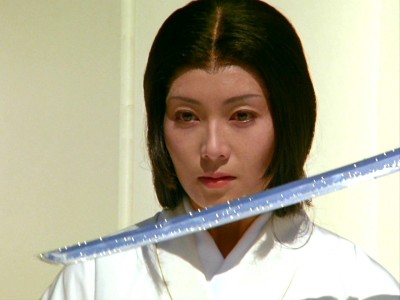
The most distinct insight into this at-times bewildering culture comes from the Mariko character, a character I found more compelling than the miniseries' nominal lead. Blackthorne's journey from English sailor to Japanese samurai may be unconventional in the specifics, but it's fairly recognizable in the structure of that traditional "hero's journey." Mariko's various plights through her evolution, however, are not nearly as familiar to us (and therefore, far more compelling). From her acceptance of the seemingly contradictory influences of her Japanese heritage and her new-found Catholicism, to her taboo love for Blackthorne, to her breaking with tradition to defy her husband, to her willingness to conduct at first a sexual affair-by-proxy with Blackthorne, to her resolute request to make Blackthorne stick to his bargain of a true, fulfilling affair with limitations, Mariko's reactions to these events are intriguingly outside our conventional expectations for melodrama. I wouldn't be surprised that if Shogun were made today, the Mariko character wouldn't take center stage. Of course, a great deal of the character's success lies with actress Yôko Shimada, a stunningly beautiful actress capable of subtle, beautiful underplaying. As exciting as Shogun is in chronicling the adventures of Westerner Blackthorne as he ascends the heights of feudal Japanese society and its warrior culture...Mariko's fascinating story commands the most interest in this well-mounted miniseries.
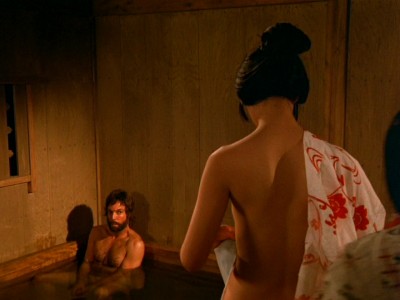
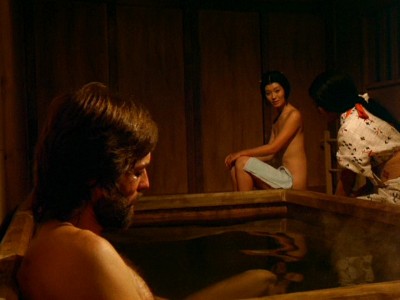
The DVD:
The Video:
The full-screen, 1.33:1 video transfer for Shogun looks quite good for the age of the original materials. As I wrote above, this edition is no different than the 2003 printing, so those who own that set won't need to double dip for any supposed remastering. As it stands, colors are reasonably good, although they don't pop (the slightly muddy reds are a clear tip-off); the image is sharpish, and screen anomalies like scratches and dirt are there, but minimal.
The Audio:
The Dolby Digital English 5.1 audio track is healthy, but not entirely expansive, with most action still front and center. The restored original mono track is probably your best bet (if you're a purist like me), with a strong re-recording level and little hiss. English subtitles are available.
The Extras:
The Making of Shogun, running 79:27, has the cast and crew, including the director, screenwriter, and the main leads (minus passed-on Mifune) discussing the myriad production problems facing this expensive mini (I found the discussion of Toho Studio's relatively primitive production facilities particularly interesting, against my own preconceived notions of that studio). Chamberlain, as always, is thoughtful, well-spoken, and cheerful, while Yôko Shimada, if possible, looks even younger and more beautiful than she did 30 years before. Three Historical Perspective Featurettes, all featuring Dr. Paul Varley of The University of Hawaii, look at various Japanese cultural aspects depicted in the mini: The Samurai, The Tea Ceremony, The Geisha. They run (together) at about 15 minutes, and they're quite interesting.
Final Thoughts:
A true TV spectacular, Shogun is a fascinating adventure that broke new ground in television standards when it premiered back in 1980. Seen today, it holds up fairly well, delivering on its expected miniseries action-and-sex conventions, while unfolding for us an intriguingly complex, long-form look at feudal Japanese society. No need to double-dip on this if you have the 2003 set. I'm highly recommending Shogun, the landmark television miniseries.
Paul Mavis is an internationally published film and television historian, a member of the Online Film Critics Society, and the author of The Espionage Filmography.


|
| Popular Reviews |
| Sponsored Links |
|
|
| Sponsored Links |
|
|
| Release List | Reviews | Shop | Newsletter | Forum | DVD Giveaways | Blu-Ray | Advertise |
|
Copyright 2024 DVDTalk.com All Rights Reserved. Legal Info, Privacy Policy, Terms of Use,
Manage Preferences,
Your Privacy Choices | |||||||













